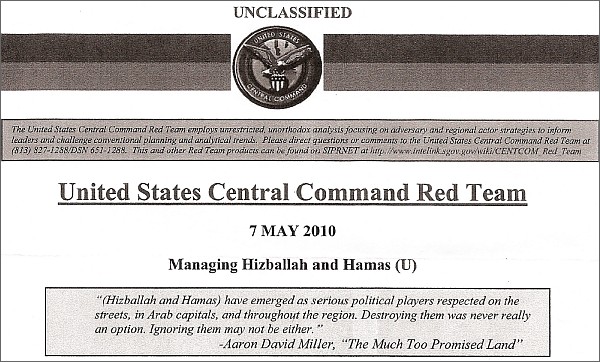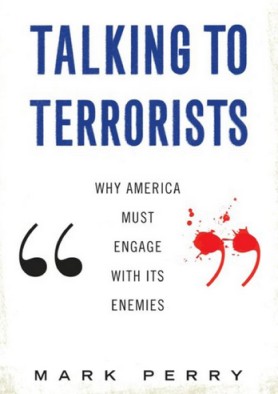The following speech by the Hezbollah leader, Hassan Nasrallah was delivered today via video feed in front of a large crowd in Beirut. The translation provided below came in tweets (hence the format below) from Roqayah at iRevolt who did instant translating and tweeting while watching the broadcast.
We are celebrating our victory over the biggest terrorist army in the Middle East (i.e. Israeli Army).
I was going to begin my words with the words covering the July War but what happened today on the Land of Heroes (South Lebanon)
On the border with the Palestinians and the fight with our heroic Lebanese army;
[The Sayyed is now dividing his speech; 1st he will speak about the war, 2nd the tribunal and lastly what shall happen after.]
Since the war stopped there have 14,000 incidents wherein the Israeli’s have broken resolution 1701
The Israeli’s are always accusing Hezb’Allah of breaking the rules but we are telling the UN that the Israeli’s should respect 1701
What we saw today is another example of the Israeli’s breaking resolution 1701 (i.e. Lebanese Army border incident)
One of the Lebanese Press Personnel was killed today but this is not new to the Israeli’s as they have been killing people from the media
Since the start of this incident today, all of Hezb’Allah’s personnel have been put on high alert.
We put all Hezb’Allah personnel and fighters under the order of the Lebanese Army; Whatever you need,we are next to you & where you want us
Anything the Army Command needs from us, everything is under their disposal. We have also called Nebih Berri,Hariri and Sleiman
After we watched how the Lebanese army is suffering, we just stood by because anything done must use wisdom.
All of Lebanon will not forgive or forget any invasion or rule-breaking. We are not afraid of you (talking to Israelis) or your threats
The Lebanese Army fought with dignity & high spirits (in regards to the incident today).The Israeli’s accused the Leb. Gov’t of instigation
The Resistance is next to the army, ready at any time; staying in our country and our cities.
All the Lebanese citizens in the South are not afraid, unlike the people in Northern Israel who began to flee.
Today,we salute the Lebanese Army. We salute the Army Commander, especially after it was recently Army Day (3eid el Jesh)
Today we are watching; There are martyrs from the Lebanese Army and civilian martyrs.
Hezb’Allah is very patient today but we are ready. This is because we must be ready in case the Army needs our help.
If the Army,the Resistance and the people face the Israeli’s then we will be able to stop them.
Thank God that the issue finished right away (in regards to the incident today).
Sayyed Hassan said that if Hezb’Allah intervened they would accuse the Resistance of stepping in because of the STL [the United Nations’ Special Tribunal for Lebanon].
I will say this before all the politicians, all the Arabs and all the world – we cannot get away from our tradition, morals .
Any place which the Israeli enemy hits the army from now on the Resistance will not stand
We might be patient now but I will be straight forward; Any hand which will extend to the Lebanese army to harm it,we will cut!
Every good person will take this decision. The Resistance has the honor to protect the country the same way.
What happened today occurred before all of the world. This has been transpiring for four years; 316 Lebanese injured in 4 years.
The Resistance has destroyed 4M cluster-bombs. Until now we have millions of cluster-bombs still in the ground (planted by Israel)
We need to have the Lebanese Gov’t pressure the UN in order to get the maps from Israel as to where they’ve planted cluster-bombs
Israel has been working to get into all facets and workings of Lebanese via spy’s. The most dangerous being that of our communication system
This is much bigger than what people know as of now (spy cells).
What this means is that we have found more than 100 spy’s, many of whom have high positions. Who have worked long w/ Israel
Many of these individuals are well respected in our society. By finding these 100+ spies it is a big hit ag. the Israeli’s
The Resistance will stay under the control of the Leb.Army,those of whom found these spies.We’ll continue to find out more ab. the spies
We should not stop or remain silent if we find a spy. We should not cover anyone because of his status. We should not wait to execute them
This is another war; Many of these spies helped Israel during the 2006 – they slaughtered the Lebanese people by aiding Israel.
Whomever wants to stop another war in Lebanon must not allow Israel to recruit spies.
We have to work on a strategy to free the Kfar Sheba and all other lands occupied by Israel.
We must face the Israeli’s in order to free our last occupied land (Kfar Sheba/Shebaa Farms)
The Army, the Resistance and the people create the victory. Everyday Lebanon faces Israel in dif. ways
For the last week we have been hearing Askenazi stating that Hezb’Allah assassinated Hezb’Allah. As you know and I know, he is no journalist
Ashkenazi is the Commander of the Israeli Army; We hear the Israel media, how they are talking about the Int’l Court and Lebanon
The Israeli media were speaking happily in terms of how Hezb’Allah will be indicted; They spoke about how the Lebanese will fight together
We spoke,weeks ago,and told everyone – including friends of Lebanon – about the dangerous plan Israel is preparing for Lebanon.
[iRevolt: Damn it. My feed is out. Bear with me folks, I apologize for the inconvenience!
Back up]
We have clear accusations that Israel assassinated Rafik Hariri
Now because some may consider talking about the STL and the indicted – some may consider this increases tension.
For this reason I will delay this part; For now we will focus on our accusations ag. Israel.
During the last few months we did our utmost to do the following: 1st, it is clear where we are headed.
We have appointed a team/committee which will study and look at all details. On Monday I will present to you clear evidence
I will prove that Israel,via its spies,since 1993 has been using the political situations in Lebanon to its advantage.
Today,on the anniversary of your victory in the 2006 war,we have a right to accuse Israel of assassinating Rafik Hariri.
My accusations will be based on evidence. I say to you today – We accuse the Israeli enemy of assassinating Rafik Hariri in 2005.
On Monday I will provide evidence. I will answer all those people who say ‘you are accusing Israel,why don’t you provide evidence?’
After this press conference the Lebanese Gov’t cannot say ‘ I do not want to know the truth’.
We are ready to cooperate with the Lebanese Gov’t. If we cooperate with one another then we will save Lebanon from a division
We in Lebanon, have called for putting together a governmental committee or any committee and find out who created false witnesses.
What is the problem in forming a committee to question the false witnesses? Don’t we have a right to call on a committee?
I would like to tell you that Hezb’Allah will stand ready and committed to contribute
Regarding the issue of war and the current situation,we all realize the aims of the 2006 war were. The main aim to crush the Resistance
Crushing the Resistance is part of many steps to be taken to “draw a new Middle East” – All related to Palestine,Iran and Syria etc
We were part of the scheme to create a “new Middle East”.
A journalist had told Sayyed Hassan that there is a plan to “crush Hezb’Allah”, a simple decision.
One of the Arab officials,I will not mention names,who was part of the Arab Delegation which traveled to NY
This Arab figure told me that when they arrived to NY they were welcomed by John Bolton. He asked the Arab figure “what are you here for?”
Bolton stated “This war will only stop once Hezb’Allah is crushed or once Hezb’Allah announces it will surrender” – This is a quote
This war was about crushing the Resistance. So,here comes the miscalculations – I would like to speak to the Israeli Enemy
You will continue to make miscalculations and mistakes. You,the enemy,are a mistake.
Noam Chomsky stated that all Israeli wars on Lebanon were Israeli decisions with American approval, all but he 2006 war.
The 2006 war was an American decision with Israeli implementation.
In the 2006 war they waited for the Resistance to collapse or run away but they found that the fighters were like high mountains.
They waited to see the Lebanese Army dismantled but the witnessed them uphold honor, dignity and sacrifice.
They wanted to the Lebanese to surrender but they found out that you are honorable and shall stay like this.
They thought ghat other religious sects besides those in the South or East may abandon the Resistance. However they were also proven wrong
The Mosques, Churches and Synagogues opened their doors for the Lebanese.
Yes,we stood and we confronted and we all achieved victory. I will now continue with the story between Bolton.
After 10 days, 13 days, 14 days passed – the situation changed in South Lebanon. The rockets continued to be launched ag. Israel
The humans fought; this is to see how small the Israeli minds are. They waged battle in Bint Jbeil for what?
In 2000 we celebrated the victory in Bint Jbeil so Israel waged an attack on Bint Jbeil because I said:
The Israeli enemy is easier to penetrate than a spiders web.
Back to the story – The Arab member of the delegation exited the meeting held in NY and was approached by Bolton.
Bolton told the official that they wish to end the war. Bolton stated that The Israeli’s said they are incapable of continuing the war
The official said “No one can say that the security council stopped the war.The Israeli’s were crushed,they wanted the war to end.”
On the 25th of May,2000 – people in Syria and Iran helped us, but no one can say that they ended the war for us.
We achieved our territory. God only helped us, God only. No one else helped us. Our people, our martyrs, our solidarity.
When the whole world was against you, you were the ones who imposed on Israel to end the war so it will not end in a catastrophe for Israel
We used a new equation which protect our country; The possibility of war always exists because Israel is hostile in nature.
Normally, those who have experience have a right to be cautious and be afraid for Lebanon. But,does this mean a war is knocking on the door?
This is not clear yet.The Israeli enemy does not need an excuse when they want to wage war.Our responsibility for our country is to be ready
Today the Israeli’s initiated the confrontation yet THEY file a complaint.If no one vetoes then we may witness a res. which condemns Lebanon
When Israel commits massacres they are not condemned.
I want to end by saying that we must raise a new equation which protects the country. The Israeli’s believe what I say
For many reasons the Israeli’s have the information and they believe what I say.
I will not say anything new; land for land, navy for navy (the same equation). We will not reveal our capabilities in terms of the air force
We will use “constructive ambiguity” for the sake of protecting the country. We may put Lebanon in danger if we reveal certain issues.
I want to say that you will send the message to the Israeli’s. We found that the Israeli’s are focusing on the people of Lebanon
The Israeli’s are responding to our targeting of the Israeli front – we were able, based on facts and truth.
The Israeli’s wanted to wage a psychological war on the Lebanese front, to create an atmosphere of fear.
When the Israeli’s targeting the Imam Hassan (AS) compound,did it contain ammunition or weapons? or a civilian apt. building?
More than 100 Lebanese,Palestinian and Syrian labor workers were targeted. The Israeli’s do not need an excuse. They target civilians
After the 2006 war the Israeli’s will abandon the Resistance,that they are sick. Does any person become sick of preserving his dignity?
August 14th, the Lebanese returned to their destroyed homes. Our message to the enemy tonight and to those who make miscalculations:
The most honorable people cannot abandon the path of the Resistance!

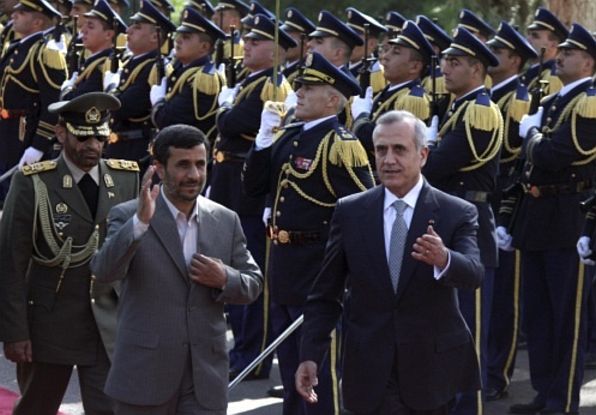
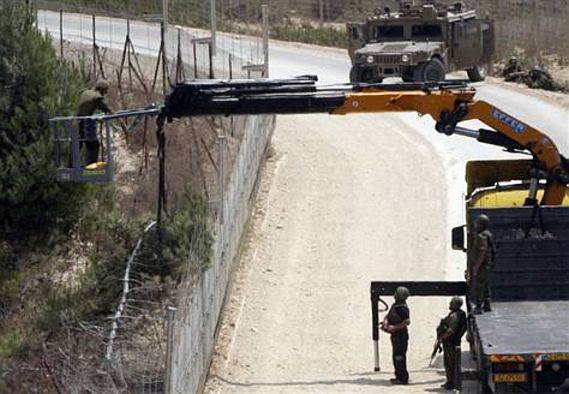
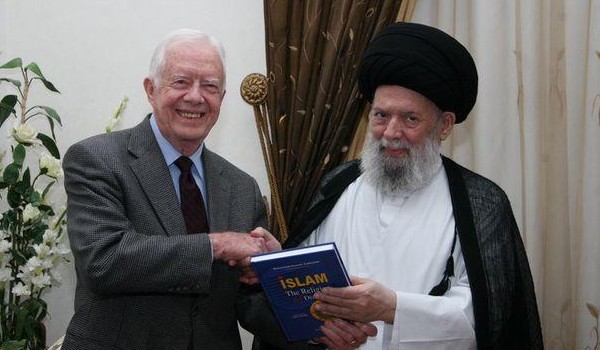
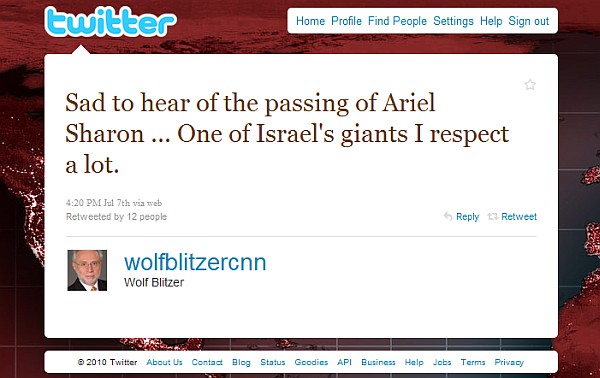
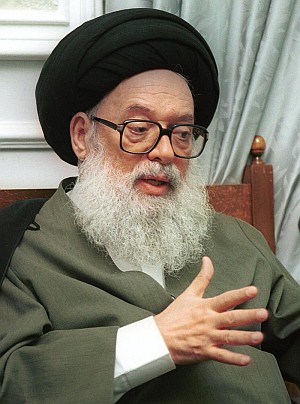 When you visited him you could be sure of a real debate, a respectful argument and you knew you would leave his presence feeling a better person. That for me is the real effect of a true man of religion; leaving an impact on everyone he meets, no matter what their faith. Sheikh Fadlallah passed away yesterday. Lebanon is a lesser place the day after but his absence will be felt well beyond Lebanon’s shores. I remember well when I was nominated ambassador to Beirut, a muslim acquaintance sought me out to tell me how lucky I was because I would get a chance to meet Sheikh Fadlallah. Truly he was right. If I was sad to hear the news I know other peoples’ lives will be truly blighted. The world needs more men like him willing to reach out across faiths, acknowledging the reality of the modern world and daring to confront old constraints. May he rest in peace.
When you visited him you could be sure of a real debate, a respectful argument and you knew you would leave his presence feeling a better person. That for me is the real effect of a true man of religion; leaving an impact on everyone he meets, no matter what their faith. Sheikh Fadlallah passed away yesterday. Lebanon is a lesser place the day after but his absence will be felt well beyond Lebanon’s shores. I remember well when I was nominated ambassador to Beirut, a muslim acquaintance sought me out to tell me how lucky I was because I would get a chance to meet Sheikh Fadlallah. Truly he was right. If I was sad to hear the news I know other peoples’ lives will be truly blighted. The world needs more men like him willing to reach out across faiths, acknowledging the reality of the modern world and daring to confront old constraints. May he rest in peace.